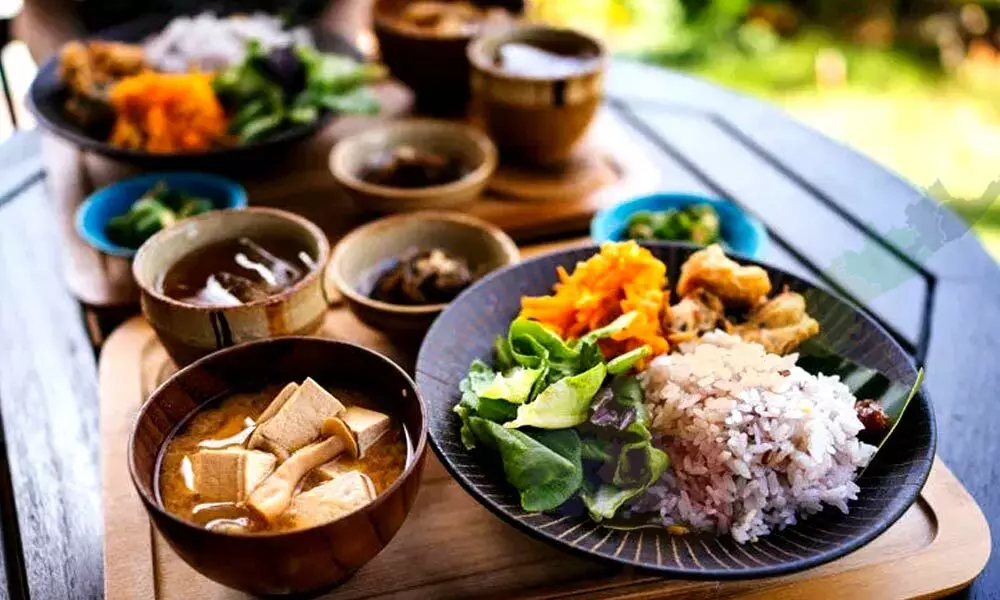Live
- TTD announces the schedule for release of March 2025 quota tokens
- Odisha’s Dilishaa crowned KIIT NanhiPari
- STA inks MoU with IIT Madras to improve road safety
- OEC to prepare coastal protection plan for Odisha
- District SP inspects Kerameri police station
- Women urged to become self-reliant
- Indiramma House Survey should be done transparently: Veerlapalli
- Ponnam urges KGBV teachers to call off strike
- India, Pak in same group; to clash on Feb 23 in Dubai
- India, Pak in same group; to clash on Feb 23 in Dubai
Just In
Traditional Japanese Diet –Can help you live Longer


Traditional Japanese Diet –Can help you live Longer
People in Japan outlive other parts of the world. Varied studies have been conducted to know their secret of longevity. One known secret is their diet.
The traditional Japanese diet is almost similar to the traditional Chinese diet, they have rice, vegetable broth cooked and pickled. Meat and fish are their staple choice. As we are aware, Japan is a group of islands; its residents usually have lots of fish when compared to other nations. They usually eat raw fish in the form of sushi and sashimi additionally they have fermented, pickled and smoked food.
They prefer either to have soya beans in the form of tofu or they have fresh edamame. The other key part of their diet consists of other beans such as aduki. Both miso and natto are also the staple food of Japanese; usually, natto is taken as breakfast.
They also love to eat land as well as sea vegetables such as seaweed. In the morning along with dessert, they have fruits such as Fuji apples, persimmons and Tangerines.
The Japanese favourite is green tea, particularly matcha tea; it is much popular in the UK. It has got lot of antioxidant compounds known as catechins, they help fight heart disease, viruses and cancer.
Healthy Eating behavior
From a very young age, Japanese children are taught healthy eating behavior, they eat only up to 80% full. The secret lies in how they serve their food, they do not have food in large plate instead they usually prefer to eat from a small bowl and on their table, they have different dishes which include a bowl of miso, 2 to 3 vegetable dishes, dish having either meat or fish and bowl of a rice. Food is often served communally and eaten in rotation. Time to time they have treats as well as snacks but very little portion.
Japanese diet health benefits
The traditional Japanese diet offers numerous health benefits.
• Good source of nutrients and beneficial compounds
The Japanese diet is believed to have rich sources of varied nutrients, which includes calcium, potassium, fiber, magnesium, vitamins A, C and E and iron.
• May Help improve digestion
Soybeans, seaweed, fruits and vegetables are an excellent source of fiber, these nutrients helps improve digestion. The above food consists soluble fiber, these help feed the beneficial bacteria in your gut and they help reduce the amount of space available for bacteria which are harmful to multiply.
• Maintaining a healthy weight is easy
The traditional Japanese diet consists lots of vegetables, they have small portion sizes and less added sugar and fat. All these contribute to less calorie count.
• Protects against Chronic Disease
The traditional diet of Japan is believed to safeguard against varied conditions such as type 2 diabetes as well as heart disease.
• Helps you live longer
One of the World's highest life expectancies is from Japan, experts believe the reason for it is, their traditional Japanese diet. Blue zone, the Japanese Island of Okinawa, people, here live a long life. Their diet majorly consists of sweet potatoes, less rice and fish when compared to the traditional Japanese diet.
Foods to Avoid or Limit
The Traditional Japanese diet restricts the following foods
• Baked foods
• Eggs
• Red meat and poultry
• Excess oil, fat and sauces
• Sugary or processed foods
• Excess oil, fat and sauces
Sample menu for three days (Japanese Diet)
Day one
Breakfast: Steamed rice, miso soup and seaweed salad
Lunch: Grilled tuna, boiled vegetables, kale salad, dashi-based broth and soba noodles
Dinner: udon noodle soup, edamame, fish cakes and vegetables marinated in vinegar.
Day two
Breakfast: Steamed rice, miso soup, dried trout, an omelet and pickled fruit.
Lunch: Rice balls wrapped with seaweed, cooked vegetable salad, marinated tofu and clam soup.
Dinner: Seaweed salad, pickled ginger, sushi and miso soup.
Day Three
Breakfast: a boiled egg, pickled vegetables, udon-noodle soup and shrimp.
Lunch: Rice cakes, shiitake-mushroom soup, steamed vegetables and seared scallops.
Dinner: steamed rice, salmon, miso soup, vegetable tempura and tuna sashimi.

© 2024 Hyderabad Media House Limited/The Hans India. All rights reserved. Powered by hocalwire.com






